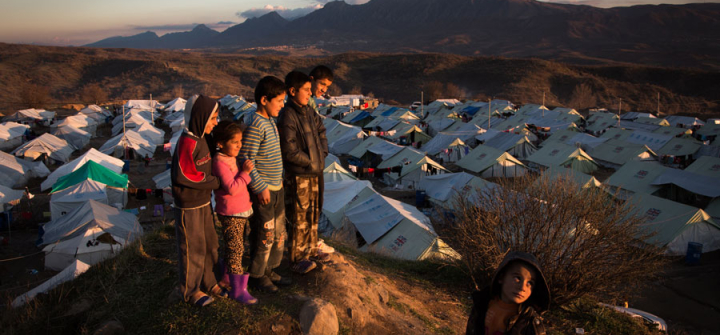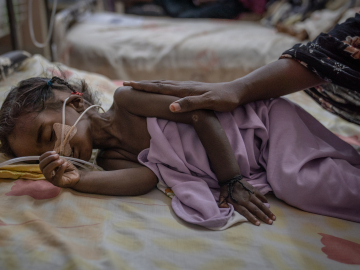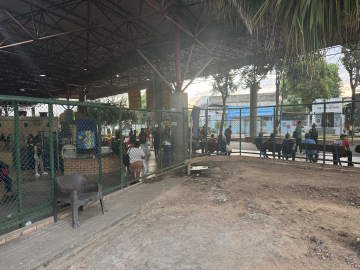The Case Against the Executive Order on Refugees
President Trump’s Executive Order on January 27 suspending the US refugee admissions program for 120 days—and barring entry of Syrian refugees indefinitely—has already had far-reaching effects for many, including those in the public health community who study refugee crises.
In response, the Johns Hopkins Bloomberg School of Public Health convened legal, health and human rights experts for a symposium yesterday, “Executive Order on Refugees: An Emerging Public Health Crisis,” to consider the measure from a public health approach. (A video of the symposium is now available.)
Restrictions of this magnitude are unlike any contemplated by the US in the last 50 years, and the order is stunning in its indefinite exclusions of Syrians, said Len Rubenstein, JD, director of the Program on Human Rights, Health, and Conflict at the Bloomberg School’s Center for Public Health and Human Rights.
Zaher Sahloul, MD, past president of the Syrian American Medical Society and Advisory Committee knows all too well what the measure means for Syrian refugees. A pulmonologist who has worked with Syrians in refugee camps in Jordan and elsewhere, he said going home is not an option for many. There are no safe zones in Syria. Jordan and Lebanon, have absorbed by far the most Syrian refugees, but they are overburdened, said Sahloul who spoke via Skype. He knows families—people who already went through the lengthy US vetting process—who have been crushed by the order.
“I think this is against international humanitarian law, and not humane,” Sahloul said.
Noting that the Refugee Act of 1980 eliminated discrimination based on race, religions, nationality, social group, or political opinion, Courtland Robinson, PhD, associate professor at the Center for Humanitarian Health at the Bloomberg School, asks, “Will our rhetoric of welcome be replaced by rhetoric of fear and exclusion?”
Emphasizing the suffering that refugees and displaced people in Iraq and Syria have endured, the panelists argued that the order not only puts the US in danger of losing its sense of humanity. It’s also off-target in its risk assessment.
While Syrians are singled out for indefinite exclusion by the order, many others will suffer, too—including Iraq’s 3.4 million displaced. 10% of all Iraqis have been forced to flee their homes, according to Gilbert Burnham, MD, a professor at the Center for Humanitarian Health. Despite the huge amount of need, Iraq’s internally displaced receive no formal assistance. People are afraid to remain in the country, Burnham said.
Shannon Doocy, PhD, associate professor, Center for Humanitarian Health, Bloomberg School, added that a majority of Syria’s refugees are being hosted in Turkey, Lebanon, and Jordan, and very few will make it to a third country for resettlement. Their health needs are vast; it’s a huge population living in limbo, and it will take decades for health system to recover, Doocy said. “I think everyone here would agree we have an ethical obligation to continue supporting protection,” she said.
Asked about responding to people who support the ban, Robinson said, “Don’t demonize the other. Look at our history. How was America formed? Who came, who came involuntarily Africans as slaves, became free by virtue of their own hard work against oppression and discrimination? … If you still accept that this order is both humane and American, then see you at the next election.”
Joshua M. Sharfstein, MD, the Bloomberg School’s associate dean for Public Health Practice & Training, urged the public health community to apply the evidence-based approach they are trained in to find solutions. That is why this Executive Order, which is not supported by evidence, “jars public health sensibilities,” he said.
The panelists offered practical advice for responses by the public health community:
- “Remember that the issues that resonate most strongly aren’t always the trends or the p-values but the stories, the suffering that people can identify with … become better communicators for these issues,” said Burnham.
- Explore how to help stabilize the health systems in affected countries, so they manage to withstand consequences of population movements, epidemics, etc.
- Monitor the consequences for people caught up in the pipeline and track their health while they are stuck in temporary asylum countries.
In closing the symposium, Nancy Kass, ScD, the Phoebe R. Berman Professor of Bioethics and Public Health at the Johns Hopkins Berman Institute of Bioethics, applied an ethics lens to the Executive Order. It did not pass the test. She urged the community to be guided by empathy for others.
She ended with a quote from Mogens Lykketoft, who was president of the 70th UN General Assembly: “The genuine loss and pain that these people are suffering should be unbearable to all of us.”
Join the thousands of subscribers who rely on Global Health NOW summaries and exclusive articles for the latest public health news. Sign up for our free weekday enewsletter, and please share the link with friends and colleagues: Subscribe to GHN
Image by Andrew McConnell/Panos for DFID Courtesy of Flickr/Creative Commons





